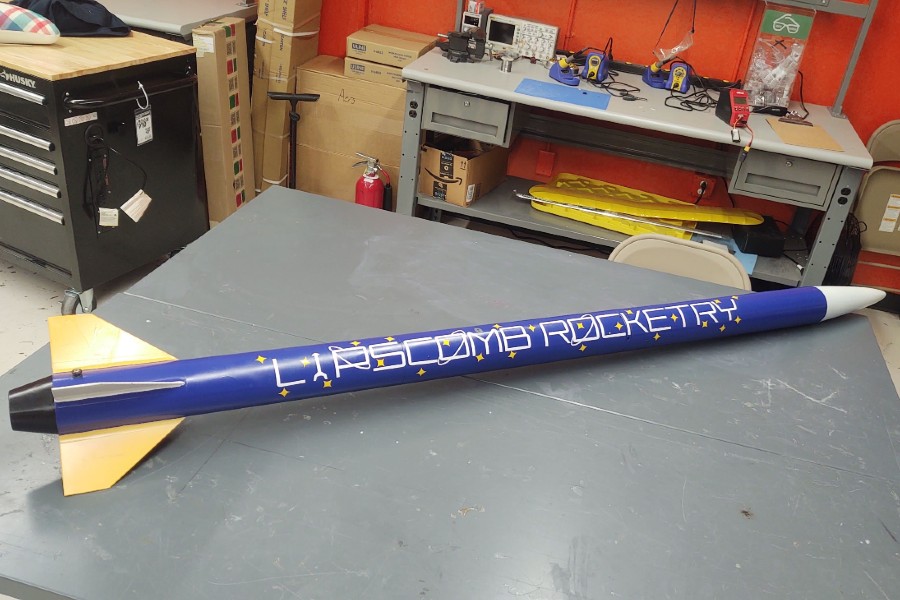Collaboration between engineering, theatre gives ‘Mamma Mia’ the wow factor
The two programs came together to construct a revolving set piece for the fall musical.
Janel Shoun-Smith and Logan Butts |

Engineering and theatre students partnered to construct a revolving set piece for the fall 2021 production of 'Mamma Mia'.
When one thinks of engineering, the peppy ABBA-inspired musical Mamma Mia, rocket branding and flying T-shirts may not be the first images that come to mind. But at Lipscomb’s Raymond B. Jones College of Engineering, all of those things have been part of the its efforts to partner with other colleges to provide students with unique customer/client experiences.
The latest partnerships have been with the George Shinn College of Entertainment & the Arts, working with faculty and students to create a revolving set piece for the fall 2021 production of Mamma Mia and to give the Lipscomb Rocketry team rocket an aesthetic makeover.
The engineering college has always been on the lookout for opportunities to partner with other colleges, said Fort Gwinn, associate dean. For example, in 2008, the college of engineering teamed up with an art student to design and build a "mechanical Bison" that shot T-shirts into the crowd at basketball games, he said.
When preparing for the upcoming fall production of Mamma Mia, Andy Bleiler, assistant professor in the Department of Theatre and production manager and scenic designer for Mamma Mia, thought back to a previous partnership with engineering to create a revolve, or a revolving stage apparatus, for the Department of Fashion and Design to use for galleries and shows.

The revolve for 'Mamma Mia' is just one of the partnerships that is enhancing education for arts and engineering students.
While the theatre department used a borrowed revolve in its 2013 production of Les Miserables, the current class includes about 50 freshman and sophomores who had never had that experience, so Bleiler decided to dust off the Lipscomb-created eight-year old revolve and use it for Mamma Mia.
When the theatre department pulled it out of storage, the revolve needed some work. There were missing and broken parts. Gwinn helped Bleiler find all the needed components.
Then they had to put the revolve back together, new parts and all, with no plans from the original project. Mark Chandler, the College of Engineering machinist who did a lot of the metalwork and machining for the gears on the original structure, and Chelsea Flowers (’13), the technical director for the theatre department worked alongside a group of theatre students to fit the puzzle together.
“The first effort was a fairly common design using a friction wheel drive,” said Gwinn. “The challenge is to make the revolving stage low profile in order to minimize the step onto the stage or the amount of built up stage around it. Our second design is, in fact, much more sophisticated, in that Mark Chandler worked with electrical and mechanical engineering students as part of their graduation requirements to design a revolutionary gear drive for the center of the stage.”

Once the revolve was completed, theatre students built a curving staircase on one side, as seen here during a performance of 'Mamma Mia'.
After completed, the theatre set practicum students built scenery onto the revolve, including a set of curved stairs, a balcony and several functioning windows. When facing one direction, the audience sees the stairs and windows. When it revolves around, the audience see a functioning balcony with doorways.
“I think it's come to be a real asset,” Bleiler said, of the partnership with engineering. “Without their hunger to want to improve, to find a better way to do everything and to get their kids involved in troubleshooting, and without our knowledge of how to use a revolve to create that wow effect, it wouldn’t have come together so beautifully.”
In addition to the revolve, engineering and art students have also partnered this school year to give the College of Engineering’s NASA Student Launch team an advantage over the competition with a rockin’ design for their rocket this year.

The team will find out in April if its snazzy new look helps it beat out the competition at the national contest.
In a valuable example of client and customer relations, teams of arts students were charged with developing potential designs for the rocket and presenting them to the University Student Launch Initiative team.
Several designs were presented and the chosen design was a sleek purple background with the team name, yellow stars and a few well-placed orbits around the letters.
The team will find out in April if its snazzy new look helps it beat out the competition at the national contest.